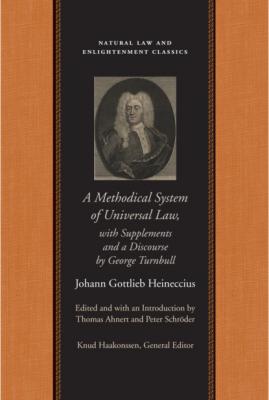A Methodical System of Universal Law. Johann Gottlieb Heineccius
Читать онлайн.| Название | A Methodical System of Universal Law |
|---|---|
| Автор произведения | Johann Gottlieb Heineccius |
| Жанр | Философия |
| Серия | Natural Law and Enlightenment Classics |
| Издательство | Философия |
| Год выпуска | 0 |
| isbn | 9781614871910 |
3. But in the third place, that we are made for benevolence because we have benevolent affections, and our principal happiness consists in the exercise of the social affections, or the social <167> virtues; and our greatest and best security for all outward enjoyments, and for having and possessing the love of others, is by being benevolent;—that upon these and many other accounts, we are made and intended for benevolence, is as evident as that a clock is made to measure time, and in consequence of the same way of reasoning, viz. the way we reason about any constitution, or any final cause. We see what sad shifts they are reduced to, who would explain away into certain selfish subtle reflexions, all that has the appearance of social, kindly and generous in our frame; and the perplexity and subtlety of such philosophy is the same argument against it, which is reckoned a very good one against complicated, perplexing hypotheses in natural philosophy, compared with more simple ones. (See some excellent observations on Hobbes’s account of pity in Dr. Butler’s excellent sermon on compassion, in a marginal note.)6 Who feels not that we are naturally disposed to benevolence, and what is the way in which our natural benevolence operates, and so points us to the proper exercises of it, while Cicero thus describes it: “There is nothing,” says he, “so natural, and at the same time so illustrious, and of so great compass, as the conjunction and society of men, including a mutual communication of conveniencies, and general love for mankind. This dearness begins immediately upon one’s birth, when the child is most affectionately beloved by the parent; from the family, it by degrees steals abroad into affinities, friendships, neighbourhoods; then amongst members of the same state; and amongst states themselves, united in interests and confederacies; and at length stretcheth itself to the whole human race. In the exercise of all these duties, we are farther disposed to observe what every man hath most need of, and what with our help he may, what without our help he cannot attain; so that in some cases the tye of relation must yield to the point of time; and some offices there are which we would rather pay to one relation than to another. Thus you ought sooner to help a neighbour with his harvest, than either brother or a familiar acquaintance; but, on the other side, in a suit at law, you ought to defend your brother or your friend before your neighbour, &c.” Cicero de fin. l. 5. c. 23. Who feels not that this is the language of nature; that thus our affections work; that thus nature moves, prompts and points us to work? And who can consider this natural tendency or course of our affections without perceiving by his reason, the advantage, the usefulness of this their natural tendency, with regard to ourselves and others equally; and consequently the fitness of our taking care that they should always continue to operate according to this rule, according to this their natural tendency? Or who does not feel that indeed this is the true account of human happiness, the happiness nature intended for us, our best and noblest happiness? <168>
Happier as kinder! in whate’er degree,
And heighth of bliss but heighth of charity.
Essay on Man, Ep. 4.7
But if nature points out this course, this regular course of our affections; if it is felt to be the state of mind that alone affords true happiness; and if the general happiness of mankind plainly requires this direction and course of our affections: If, in one word, nature dictates it, and reason must approve of it in every view we can take of it, in what sense can it be denied to be our natural duty and the will of our Creator? And is it any wonder, that this rule of conduct hath been known to thinking men in all ages (as we cannot look into ancient authors without clearly seeing it hath been) since every heart dictates it to itself? This rule, “Do as you would be done by,”8 is a rule of easy application, and it is universal, or it gives an easy, ready and clear solution in all cases. This appears from our Author’s preceding and following applications of it to cases: for it is from it alone he reasons throughout all his deductions of duties. And that it is an equal, just, or reasonable rule, cannot be denied without asserting this absurdity, That what is true and just in one case, is not always and universally true and just in all similar cases. Again, that we are made to love mankind, and to live in the exercise of love and benevolence, is plain from our make and frame, and the intention of our Maker thereby discovered to us, according to all the received rules of reasoning about final causes. And therefore the principles upon which our Author builds, are in every view of them beyond all dispute. He now proceeds to enquiries of a more complex nature; but he still continues to argue from the same self-evident truths.
